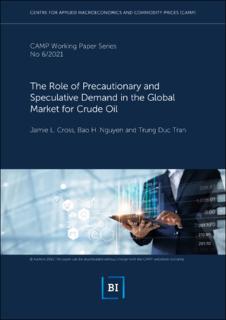The Role of Precautionary and Speculative Demand in the Global Market for Crude Oil
Working paper
Permanent lenke
https://hdl.handle.net/11250/2827429Utgivelsesdato
2021-11-01Metadata
Vis full innførselSamlinger
Sammendrag
Contemporary structural models of the global market for crude oil jointly specify precautionary and speculative demand as a composite shock, known as storage demand shocks, due to difficulties in identifying these distinct demand components. This difficulty arises because shifts in the underlying expectations are latent and operate through similar transmission mechanisms. In this paper, we resolve this identification problem and for the first time examine the relative effects of these two shocks, in addition to more conventional demand and supply shocks, on the global price of crude oil. Overall, we find that uncertainty driven precautionary demand for crude oil is, on average, the primary driver of fluctuations in the real price of oil that has previously been associated with the composite storage demand shock. Historically, we find that these shocks also shaped the real oil price dynamics since the 1970s. Precautionary demand for oil was the primary driver of the oil price spike in the 1979 oil crisis, the second most important driver of the price decline in the Great Recession of 2008 and provided significant contributions towards the price dynamics during the Iran-Iraq War of 1980, the Persian Gulf War of 1990, the collapse of OPEC in 1985. Speculative demand for oil largely shaped the oil price dynamics around the collapse of OPEC and contributed towards the oil price spike in the Persian Gulf War and the oil price decline of 2014.
